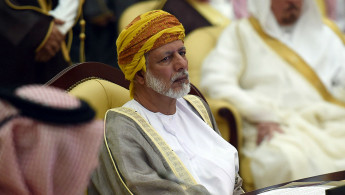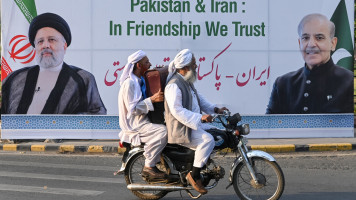Follow Paul McLoughlin on Twitter: @PaullMcLoughlin
Oman and Kuwait go gently into Saudi Arabia and Canada dispute
Oman and Kuwait go gently into Saudi Arabia and Canada dispute
Oman became the latest Gulf country to back Saudi Arabia in its diplomatic dispute with Canada, but used carefully guarded words.
4 min read
Oman has tread carefully in the latest diplomatic spat to hit the region [AFP]
Oman backed Saudi Arabia in its diplomatic dispute with Canada on Tuesday, but urged both parties to find a resolution to end the crisis.
Oman's ministry of foreign affairs issued a statement regarding Saudi Arabia's surprise decision to sever ties with Canada, after Ottawa was perceived to be interfering in Riyadh's domestic affairs.
"The sultanate follows the current political situation between the Kingdom of Saudi Arabia and Canada and affirms its firm position not to interfere in the internal affairs of other states," the statement read.
"It hopes that both countries will resolve the matter."
The Saudi-Canada spat is the latest diplomatic crisis to rock the region, since the ascent of Saudi Crown Prince Mohammed bin Salman, who has pushed Riyadh and its allies towards a more bullish foreign policy.
Saudi Arabia has recently led an Arab coalition to war in Yemen - which has cost more than 13,000, mostly civilian, lives - engineered a blockade of Gulf neighbour Qatar, a new cold war with Iran. These are conditions that are not ideal for Oman and Kuwait, which have promoted policies of calm and stability in the region.
Neutrality
Oman has a long-established policy of neutrality in foreign affairs, and managed to avoid taking clear sides in Saudi Arabia's recent disputes with Qatar, Iran, and the Syrian regime.
It was the only Gulf Cooperation Council (GCC) member not to join the Saudi-led coalition against Houthi rebels in Yemen in 2015, and has remained largely neutral in the war.
Kuwait also prides itself on its neutral foreign policy, and with Oman has acted as an interlocutor in recent regional crises.
It too felt the need to gently rebuke Canada for its "interference" in Saudi Arabia's domestic affairs.
"Kuwait has been followed with concern the latest development... [and] stressed its firm position rejecting interference in the internal affairs of states and respecting their sovereignty in line with international charters and norms," Kuwait's foreign ministry said in a statement.
Kuwait added that, like Oman, it remained "hopeful" the two countries would soon restore ties.
Riyadh's GCC allies Bahrain and the UAE were swifter and more forthright in their backing of Saudi Arabia against Canada.
Qatar, which is currently being blockaded by Saudi Arabia, Bahrain and the UAE, is the only GCC party not to comment on the crisis.
Other Arab allies of Saudi Arabia - including Jordan, Sudan and the Palestinian Authority - have also issued statements condemning external interference and showing support for its "regional partners".
Trade war
In just over two days, Saudi Arabia has severed diplomatic ties with Canada, ordered Saudi students out of the North American country, and cut trade links, after Ottawa criticised the arrest of human rights activists in the kingdom.
"Canada is gravely concerned about additional arrests of civil society and women's rights activists in Saudi Arabia, including Samar Badawi. We urge the Saudi authorities to immediately release them and all other peaceful human rights activists," Foreign Policy CAN tweeted on Friday.
It followed the arrest of human rights activist Samar Badawi, sister of jailed blogger Raif Badawi.
Saudi Arabia fired back declaring Canada's ambassador a persona non grata and ordered their own head envoy in Ottawa to return home.
Despite the boycott, Canada has remained defiant and said it will continue to criticise Saudi Arabia's human rights record when necessary.
"Canada will always stand up for the protection of human rights, including women's rights and freedom of expression around the world," she said.
Analysts say that Canada's minor trade links with Saudi Arabia make it the perfect candidate for Riyadh - under powerful Crown Prince Mohammed bin Salman - to flex its muscles and show Western governments it will not tolerate criticism of its domestic affairs.
"I think the main reason of the crisis is that Saudi officials can't tolerate any kind of criticism especially when it comes to their record in human rights issues because the main aim is to consolidate power," Ali Bakeer, an Ankara-based political analyst and researcher, told The New Arab.
"The exaggerated reaction was in order to send message for other countries not to follow the Canadian way and criticise Saudi Arabia."
Bakeer added that bin Salman will likely be aware that the Trump administration is not on good terms with Prime Minister Justin Trudeau - following public spats between the US president and Canadians leader - and this has emboldened Riyadh to make this move.
A report in Reuters suggested that Canada will rely on the UK and UAE's diplomatic leverage to try help end the crisis, due to US reluctance to delve into the fray between its two allies.
Neither country has shown any signs it is willing to interfere in the crisis.
Saudi Arabia remains probably the strongest Arab partner of the Trump administration, and has recently agreed a number of huge arms deals with the US.
With the blockade of Qatar now well into its second year and no parties stepping forward to resolve the current Canada-Saudi crisis, it could be left to Oman and Kuwait to follow its long-followed practices of cooling tensions and fixing problems.
Oman's ministry of foreign affairs issued a statement regarding Saudi Arabia's surprise decision to sever ties with Canada, after Ottawa was perceived to be interfering in Riyadh's domestic affairs.
"The sultanate follows the current political situation between the Kingdom of Saudi Arabia and Canada and affirms its firm position not to interfere in the internal affairs of other states," the statement read.
"It hopes that both countries will resolve the matter."
The Saudi-Canada spat is the latest diplomatic crisis to rock the region, since the ascent of Saudi Crown Prince Mohammed bin Salman, who has pushed Riyadh and its allies towards a more bullish foreign policy.
Saudi Arabia has recently led an Arab coalition to war in Yemen - which has cost more than 13,000, mostly civilian, lives - engineered a blockade of Gulf neighbour Qatar, a new cold war with Iran. These are conditions that are not ideal for Oman and Kuwait, which have promoted policies of calm and stability in the region.
Neutrality
Oman has a long-established policy of neutrality in foreign affairs, and managed to avoid taking clear sides in Saudi Arabia's recent disputes with Qatar, Iran, and the Syrian regime.
It was the only Gulf Cooperation Council (GCC) member not to join the Saudi-led coalition against Houthi rebels in Yemen in 2015, and has remained largely neutral in the war.
Kuwait also prides itself on its neutral foreign policy, and with Oman has acted as an interlocutor in recent regional crises.
It too felt the need to gently rebuke Canada for its "interference" in Saudi Arabia's domestic affairs.
"Kuwait has been followed with concern the latest development... [and] stressed its firm position rejecting interference in the internal affairs of states and respecting their sovereignty in line with international charters and norms," Kuwait's foreign ministry said in a statement.
Kuwait added that, like Oman, it remained "hopeful" the two countries would soon restore ties.
Riyadh's GCC allies Bahrain and the UAE were swifter and more forthright in their backing of Saudi Arabia against Canada.
Qatar, which is currently being blockaded by Saudi Arabia, Bahrain and the UAE, is the only GCC party not to comment on the crisis.
Other Arab allies of Saudi Arabia - including Jordan, Sudan and the Palestinian Authority - have also issued statements condemning external interference and showing support for its "regional partners".
Trade war
In just over two days, Saudi Arabia has severed diplomatic ties with Canada, ordered Saudi students out of the North American country, and cut trade links, after Ottawa criticised the arrest of human rights activists in the kingdom.
"Canada is gravely concerned about additional arrests of civil society and women's rights activists in Saudi Arabia, including Samar Badawi. We urge the Saudi authorities to immediately release them and all other peaceful human rights activists," Foreign Policy CAN tweeted on Friday.
 |
The exaggerated reaction was in order to send message for other countries not to follow the Canadian way and criticise Saudi Arabia. - Dr. Ali Bakeer, analyst and researcher |
 |
It followed the arrest of human rights activist Samar Badawi, sister of jailed blogger Raif Badawi.
Saudi Arabia fired back declaring Canada's ambassador a persona non grata and ordered their own head envoy in Ottawa to return home.
Despite the boycott, Canada has remained defiant and said it will continue to criticise Saudi Arabia's human rights record when necessary.
"Canada will always stand up for the protection of human rights, including women's rights and freedom of expression around the world," she said.
Analysts say that Canada's minor trade links with Saudi Arabia make it the perfect candidate for Riyadh - under powerful Crown Prince Mohammed bin Salman - to flex its muscles and show Western governments it will not tolerate criticism of its domestic affairs.
"I think the main reason of the crisis is that Saudi officials can't tolerate any kind of criticism especially when it comes to their record in human rights issues because the main aim is to consolidate power," Ali Bakeer, an Ankara-based political analyst and researcher, told The New Arab.
"The exaggerated reaction was in order to send message for other countries not to follow the Canadian way and criticise Saudi Arabia."
Bakeer added that bin Salman will likely be aware that the Trump administration is not on good terms with Prime Minister Justin Trudeau - following public spats between the US president and Canadians leader - and this has emboldened Riyadh to make this move.
A report in Reuters suggested that Canada will rely on the UK and UAE's diplomatic leverage to try help end the crisis, due to US reluctance to delve into the fray between its two allies.
Neither country has shown any signs it is willing to interfere in the crisis.
Saudi Arabia remains probably the strongest Arab partner of the Trump administration, and has recently agreed a number of huge arms deals with the US.
With the blockade of Qatar now well into its second year and no parties stepping forward to resolve the current Canada-Saudi crisis, it could be left to Oman and Kuwait to follow its long-followed practices of cooling tensions and fixing problems.



